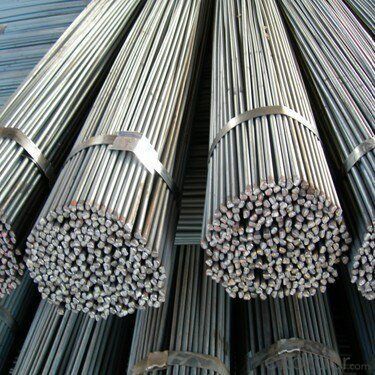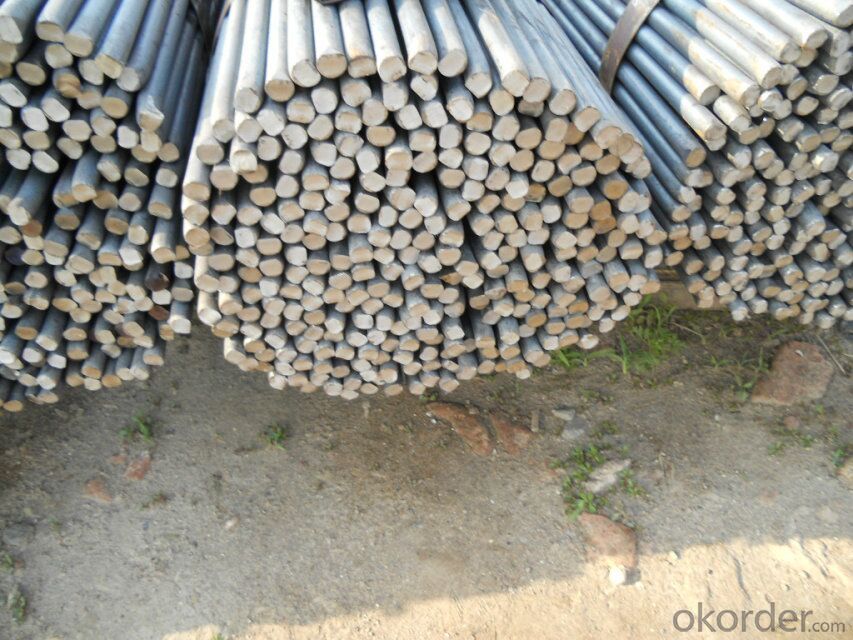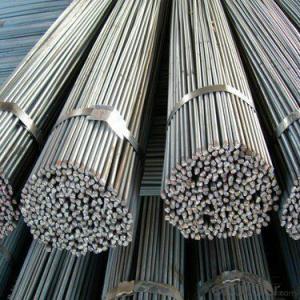Q235 Round Bar Chromed Steel Round Bar-Steel Round Bar
- Loading Port:
- Tianjin
- Payment Terms:
- TT OR LC
- Min Order Qty:
- 25 m.t.
- Supply Capability:
- 20000 m.t./month
OKorder Service Pledge
OKorder Financial Service
You Might Also Like
Item specifice
Product Description:
OKorder is offering Q235 High quality Round Bar Chromed Steel Round Bar-Steel Round Bar at great prices with worldwide shipping. Our supplier is a world-class manufacturer of steel, with our products utilized the world over. OKorder annually supplies products to European, North American and Asian markets. We provide quotations within 24 hours of receiving an inquiry and guarantee competitive prices.
Product Applications:
Q235 Round Bar Chromed Steel Round Bar-Steel Round Bar are ideal for structural applications and are widely used in the construction of buildings and bridges, and the manufacturing, petrochemical, and transportation industries.
Product Advantages:
OKorder's Q235 Round Bar Chromed Steel Round Bar-Steel Round Bar are durable, strong, and resist corrosion.
Main Product Features:
· Premium quality
· Prompt delivery & seaworthy packing (30 days after receiving deposit)
· Corrosion resistance
· Can be recycled and reused
· Mill test certification
· Professional Service
· Competitive pricing
Product Description:
Specifications of High Quality Round Bar
1. Grade: GB, JIS, ASTM, EN
2. Grade: Q235, SS400, A36, S235JR
3. Diameter and mass: As below
Diameter | Mass | Diameter | Mass | Diameter | Mass |
(mm) | (kg/m) | (mm) | (kg/m) | (mm) | (kg/m) |
6 | 0.22 | 22 | 2.98 | 53 | 17.30 |
7 | 0.30 | 24 | 3.55 | 56 | 19.30 |
8 | 0.40 | 25 | 3.85 | 60 | 22.20 |
9 | 0.50 | 26 | 4.17 | 63 | 24.50 |
10 | 0.62 | 28 | 4.83 | 65 | 26.00 |
11 | 0.75 | 30 | 5.55 | 70 | 30.20 |
12 | 0.89 | 32 | 6.31 | 75 | 34.70 |
13 | 1.04 | 34 | 7.13 | 80 | 39.50 |
14 | 1.21 | 36 | 7.99 | 85 | 44.50 |
15 | 1.39 | 38 | 8.90 | 90 | 49.90 |
16 | 1.58 | 40 | 9.86 | 95 | 55.60 |
17 | 1.78 | 42 | 10.90 | 100 | 61.70 |
18 | 2.00 | 45 | 12.50 | 120 | 88.85 |
19 | 2.23 | 48 | 14.20 | 140 | 120.93 |
20 | 2.47 | 50 | 15.40 | 150 | 138.82 |
Usage and Applications of High Quality Round Bar
1) Suitable for making various strong cutting tool abrasion resistance, impact resistance.
2) Used to produce all kinds of high hard and super hard saw blade, drill, tap, broach, gear hob and various kinds of milling cutter.
3) Used for advanced punching die, screw die, and the toughness and complicated shape of the punch, etc.
4) Is used for cold forging die and drawing mode, etc.
5) Recommended watchcase factory, screw factory and other cold stamping products industry use.
Packaging & Delivery of High Quality Round Bar
Packaging Detail: All goods are packed in bundle with steel strips and shipped by break bulk vessel or container (depend on target market and different ports)
Delivery Detail: 45 days
Trade terms: FOB, CFR, CIF
MOQ: 25 tons per specification; we can negotiate the quantity if the specification is normal or we have stock of one specification.
Weight: The price invoicing on theoretical weight basis or actual weight basis depends on customer’s request.
Shipment: The shipment of bulk break or container is depends on customer’s request and the situation of the port of destination.
Documents given: Full set of original clean on board bill of lading; Original signed commercial invoice; Original packing list; Policy of insurance; Certificate of origin and what the target market needs.
Production Flow of High Quality Round Bar
The common processes are preheated forging quenching, dual refinement solution process, cooling quenching and isothermal quenching. We use heat treatment for dual refinement solution process. The main measures process is high temperature solution and refinement cycle. High temperature solution can improve the carbide morphology and particle size. The aim is to make the loop refinement ultrafine austenite grains.
FAQ:
Q1: Why buy Materials & Equipment from OKorder.com?
A1: All products offered byOKorder.com are carefully selected from China's most reliable manufacturing enterprises. Through its ISO certifications, OKorder.com adheres to the highest standards and a commitment to supply chain safety and customer satisfaction.
Q2: How do we guarantee the quality of our products?
A2: We have established an advanced quality management system which conducts strict quality tests at every step, from raw materials to the final product. At the same time, we provide extensive follow-up service assurances as required.
Q3: How soon can we receive the product after purchase?
A3: Within three days of placing an order, we will begin production. The specific shipping date is dependent upon international and government factors, but is typically 7 to 10 workdays.
Images:


- Q:What are the different types of carbon steel round bars?
- There are several different types of carbon steel round bars available on the market. Some of the commonly used types include: 1. Mild Steel Round Bars: These are the most common type of carbon steel round bars. They have a low carbon content and are easy to weld, cut, and form. Mild steel round bars are suitable for general engineering purposes and have excellent machinability. 2. Medium Carbon Steel Round Bars: These round bars have a higher carbon content than mild steel round bars. They offer better strength and hardness, making them suitable for applications that require higher load-bearing capacity. Medium carbon steel round bars are commonly used in automotive, construction, and machinery industries. 3. High Carbon Steel Round Bars: These round bars have a higher carbon content, typically above 0.60%. They offer superior strength, hardness, and wear resistance. High carbon steel round bars are commonly used in applications that require high strength, such as springs, cutting tools, and axles. 4. Free Cutting Steel Round Bars: These round bars have added elements, such as sulfur or lead, to improve machinability. They are commonly used in applications where easy machining is required, such as in the production of bolts, screws, and fittings. 5. Alloy Steel Round Bars: These round bars contain additional alloying elements, such as chromium, nickel, or molybdenum, to enhance specific properties. Alloy steel round bars offer improved strength, hardness, corrosion resistance, and heat resistance. They are commonly used in applications that require high performance, such as in the aerospace, oil and gas, and automotive industries. It is important to consider the specific requirements of your project or application when selecting the type of carbon steel round bar to ensure optimal performance and durability.
- Q:Can steel round bars be hardened and tempered?
- Yes, it is possible to harden and temper steel round bars. Hardening and tempering are heat treatments that can enhance the hardness and strength of steel. To harden a steel round bar, it must be heated to a high temperature and then rapidly cooled, typically through quenching in water, oil, or air. This procedure alters the steel's structure, resulting in increased hardness and brittleness. However, the hardened steel round bar may be too brittle for many applications. To address this issue and improve its toughness, the hardened steel is subjected to tempering. Tempering entails reheating the steel to a specific temperature and holding it at that temperature for a designated period before allowing it to cool naturally. This process enables the steel to partially soften and alleviate internal stresses, thereby enhancing toughness and ductility. The hardness and tempering temperature can be adjusted to achieve desired mechanical properties for various applications. By employing the hardening and tempering process, steel round bars with different levels of hardness, strength, and toughness can be produced to meet specific engineering requirements.
- Q:Can steel round bars be used for making marine equipment?
- Certainly! Steel round bars are a viable option for the fabrication of marine equipment. Steel, being a versatile and resilient material, is extensively utilized in the maritime industry owing to its exceptional strength, resistance to corrosion, and capacity to endure harsh environmental conditions. By manipulating steel round bars, through machining, welding, and shaping, one can create a wide array of sizes and forms that precisely meet the unique specifications of marine equipment. Predominantly, these round bars are employed in the production of marine components such as propeller shafts, rudders, anchor chains, and structural supports. Moreover, to augment its resistance to corrosion, steel can be coated or treated, ensuring its suitability for prolonged exposure to saltwater and other corrosive elements prevalent in marine settings.
- Q:What is the resistance to fatigue of a steel round bar?
- The ability of a steel round bar to resist fatigue refers to its capacity to endure repeated cycles of loading and unloading without failing or deforming. Fatigue resistance is a crucial mechanical property for materials utilized in diverse applications, including structural components, machinery, and automotive parts. Several factors influence the fatigue resistance of a steel round bar, including the specific grade of steel, its microstructure, surface condition, and the applied loading conditions. Steel is widely recognized for its exceptional fatigue resistance in comparison to other materials, which explains its extensive utilization across various industries. The high strength, ductility, and presence of various alloying elements in steel contribute to its resistance to fatigue. These characteristics enable steel to endure cyclic loading without significant deformation or weakening. Moreover, the microstructure of the steel, such as grain size and distribution, significantly impacts its fatigue resistance. Engineers typically conduct fatigue tests, such as rotating beam or axial loading tests, to assess the fatigue resistance of a steel round bar. These tests subject the steel bar to controlled cyclic loading and measure the number of cycles it can withstand before failure occurs. The results determine the fatigue strength or fatigue limit of the steel, representing the maximum stress level it can indefinitely endure without failing. It is important to acknowledge that the fatigue resistance of a steel round bar can vary due to factors like surface defects, stress concentration, and environmental conditions. Therefore, proper design considerations, such as surface treatments, stress reduction techniques, and appropriate loading specifications, are crucial to ensure the desired fatigue performance of the steel round bar in specific applications.
- Q:How do you prevent corrosion on steel round bars?
- One way to prevent corrosion on steel round bars is by applying a protective coating, such as paint or a corrosion-resistant metal coating like zinc or epoxy. Regular maintenance, including cleaning and removing any dirt or moisture buildup, can also help prevent corrosion. Additionally, storing the steel round bars in a dry and controlled environment can minimize exposure to moisture and prevent corrosion.
- Q:Can steel round bars be used in the manufacturing of household appliances?
- Yes, steel round bars can be used in the manufacturing of household appliances. Steel is a versatile and durable material that is commonly used in various industries, including the manufacturing of household appliances. Steel round bars can be utilized in the construction of appliance frames, support structures, and even internal components. The high strength and resistance to corrosion of steel make it an ideal choice for ensuring the durability and longevity of household appliances. Additionally, steel can be easily molded and shaped according to specific requirements, allowing for the production of appliances with intricate designs and precise dimensions. Overall, the use of steel round bars in the manufacturing of household appliances contributes to the production of high-quality, reliable, and long-lasting products.
- Q:Can steel round bars be used for making automotive suspension systems?
- Yes, steel round bars can be used for making automotive suspension systems. Steel round bars offer several advantages that make them suitable for this application. Firstly, steel is known for its high strength and durability, which are essential qualities for suspension components that need to withstand heavy loads and constant vibrations. Steel round bars also provide excellent stiffness and rigidity, allowing them to maintain the desired shape and function under various driving conditions. Furthermore, steel is readily available and cost-effective, making it a popular choice for automotive manufacturers. Additionally, steel round bars can be easily machined and formed into complex shapes, enabling the production of suspension components with precise dimensions and specifications. Overall, steel round bars are a reliable and practical material for making automotive suspension systems.
- Q:Can steel round bars be used for making fasteners or bolts?
- Certainly! The utilization of steel round bars is viable for the production of fasteners and bolts. Steel is widely employed as a material for these components due to its exceptional robustness, longevity, and resistance against corrosion. The round bars, crafted from steel, can be effortlessly manipulated and threaded, enabling the creation of an array of fasteners and bolts such as screws, nuts, and threaded rods. The selection of the precise steel grade hinges upon the specific application and desired strength properties. Nevertheless, it is imperative to bear in mind that the manufacturing process and stringent quality control are paramount in guaranteeing the dependability and performance of the end product.
- Q:What are the advantages of using tool steel round bars?
- Tool steel round bars offer several advantages: 1. High hardness: Tool steel round bars have exceptional hardness, making them ideal for applications that require resistance to wear, abrasion, and deformation. This property ensures longevity and durability of the tool. 2. Excellent machinability: Tool steel round bars are known for their excellent machinability, meaning they can be easily shaped, cut, and formed into various tool designs. This enhances the versatility and precision of the tool. 3. Superior strength and toughness: Tool steel round bars possess exceptional strength and toughness, enabling them to withstand high impact and shock loading. This makes them suitable for heavy-duty applications where tools are subjected to intense pressure and stress. 4. Good heat resistance: Tool steel round bars exhibit excellent heat resistance, allowing them to retain their hardness and strength even at high temperatures. This characteristic is crucial for tools used in applications involving heat treatment, forging, and molding. 5. Corrosion resistance: Many tool steel alloys contain elements such as chromium, vanadium, and molybdenum, which enhance their corrosion resistance. This makes tool steel round bars suitable for applications in corrosive environments, ensuring longevity and performance. 6. Precise dimensional accuracy: Tool steel round bars are manufactured to precise dimensional tolerances, ensuring uniformity and consistency in their shape and size. This level of accuracy is crucial for ensuring the proper fit and functionality of the tool. Overall, the advantages of using tool steel round bars lie in their hardness, machinability, strength, heat resistance, corrosion resistance, and dimensional accuracy, making them a preferred choice for various tooling applications.
- Q:What are the different types of steel round bar alloys for improved machinability and strength?
- There are several different types of steel round bar alloys that are specifically designed to offer improved machinability and strength. These alloys are commonly used in various industries where the ability to machine components efficiently while maintaining high tensile strength is crucial. Some of the most popular steel round bar alloys for improved machinability and strength include: 1. 12L14: This alloy contains lead, which acts as a lubricant during machining, resulting in improved chip formation and reduced tool wear. It offers excellent machinability and good strength, making it suitable for applications that require intricate machining processes. 2. 4140: Also known as "chromoly" steel, this alloy contains chromium and molybdenum, which enhance its strength and hardenability. 4140 steel round bars are widely used in applications that require high tensile strength, such as automotive parts, shafts, and gears. 3. 8620: This alloy is a low-alloy nickel-chromium-molybdenum steel that offers a combination of high strength and good toughness. It can be easily machined and is often used in applications that require case-hardening, such as gears, shafts, and fasteners. 4. 1018: Known as "cold-rolled" or "cold-finished" steel, 1018 is a low-carbon steel alloy that offers good machinability and weldability. It is commonly used in applications where precise and smooth finishes are required, such as in the manufacturing of bolts, screws, and hydraulic fittings. 5. 52100: This alloy is a high carbon, chromium-bearing steel that is primarily used in the manufacturing of bearings and other high-wear applications. It offers excellent hardness, wear resistance, and machinability, making it suitable for components that require high strength and durability. These are just a few examples of the different types of steel round bar alloys available for improved machinability and strength. The choice of alloy depends on the specific requirements of the application, such as the desired strength, machinability, and durability. Consulting with a materials engineer or supplier can help determine the most suitable alloy for a particular use case.
1. Manufacturer Overview |
|
|---|---|
| Location | |
| Year Established | |
| Annual Output Value | |
| Main Markets | |
| Company Certifications | |
2. Manufacturer Certificates |
|
|---|---|
| a) Certification Name | |
| Range | |
| Reference | |
| Validity Period | |
3. Manufacturer Capability |
|
|---|---|
| a)Trade Capacity | |
| Nearest Port | |
| Export Percentage | |
| No.of Employees in Trade Department | |
| Language Spoken: | |
| b)Factory Information | |
| Factory Size: | |
| No. of Production Lines | |
| Contract Manufacturing | |
| Product Price Range | |
Send your message to us
Q235 Round Bar Chromed Steel Round Bar-Steel Round Bar
- Loading Port:
- Tianjin
- Payment Terms:
- TT OR LC
- Min Order Qty:
- 25 m.t.
- Supply Capability:
- 20000 m.t./month
OKorder Service Pledge
OKorder Financial Service
Similar products
New products
Hot products
Hot Searches
Related keywords































